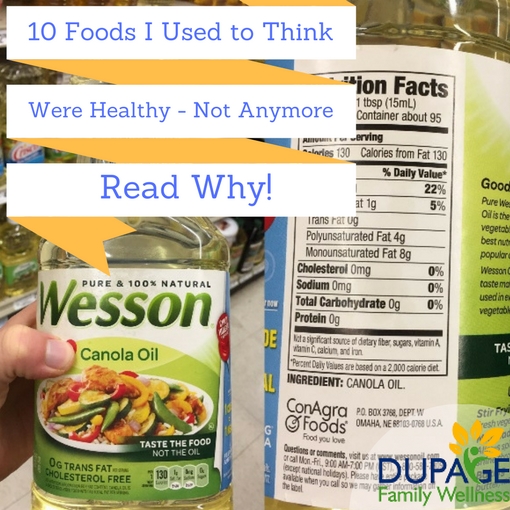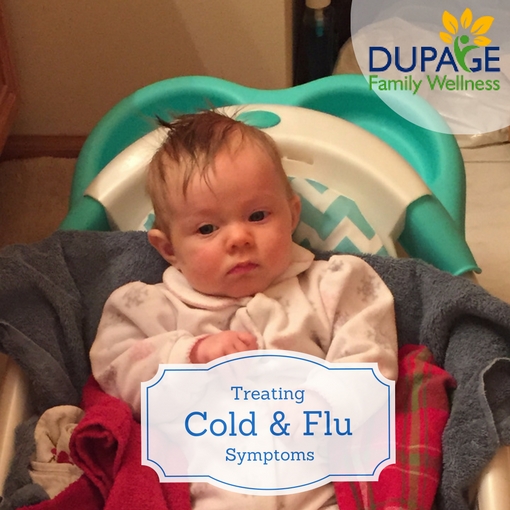
I used to be a calorie counter. I figured if I ate less calories than I burned, I’d lose weight! When it didn’t work, I was confused.
Many seminars later, I now understand that our food is MUCH more than just a source of calories! Our bodies are not simple scales, balancing calories in and calories out. Rather, the body has many complex chemical systems that break down the food we eat and process each ingredient in a different way!
I took a walk down memory lane at the grocery store yesterday, taking photos of foods I used to buy because I thought they were healthy. Keep reading to see these photos, along with the reasons that I no longer buy them. Note that my concern is with the entire categories or types of food, and I am not trying to single out the particular brand pictured.
Food Marketing Is Tricky
An important point to keep in mind is that food marketers can be really tricky. The food marketers do a fantastic job of making foods look and sound healthy to the consumer. They throw in buzz words like “gluten free”, “low fat”, “heart healthy”, “all natural”, etc. to make us believe the foods are good for us. What do these words really mean? I’ll point out examples as I go!
Also realize that their bottom line is the main concern of companies that make these products. What helps their bottom line?
- Making the food as cheaply as possible.
- Making the food's shelf life as long as possible.
- Making the food addictive so we want to keep eating it and buying it. They test combinations of sugar, salt, fat, and chemicals that taste good, AND keep up coming back for more.
These corporate motivations are NOT in our best interest! I don’t want the cheapest ingredients in my body. I want my food to go bad! This sounds weird, but if it will last on a shelf forever without bacteria consuming it, it must be full of chemicals to keep the bacteria away. Why should I eat it? Finally, I don’t want to be addicted to my food. Everyone knows that it’s hard to eat just one chip or cookie, but you don’t notice the same addictive behavior when it comes to broccoli or an apple!
Let's get started with the foods. They are in no particular order. It's hard to read the labels. To see them better, click on the picture, and a bigger image will pop up in a new window on your computer.
Read more ...

Jared is my husband. I am SO proud of him, and SO excited that he's improved his health by losing 67 pounds!
After several years of "gentle convincing," Jared finally decided that he wanted to lose weight, and he agreed to follow my advice about what he should eat. I am going to let him tell his own story, so keep reading.
As I helped Jared make these changes, I realized that there are SO MANY people that want to FEEL BETTER and LOOK BETTER. There was no way I could stop with Jared. I decided to create an online wellness program to guide people like you to improve your weight and health too!
If you are interested in looking and feeling your best in 2017, come join me! I will share what you should eat, what you shouldn't eat, and daily tips to help you successfully do what Jared did! Sign up now for Dr. Jamie's 7 Week Nutrition Boot Camp: Real Food, Real Results
- Dr. Jamie Thomure
Jared's Story
January 1: 269 pounds - December 12: 202 pounds
I know it sounds too good to be true. I don’t know if I’d be able to believe it if it wasn’t what I actually did. No, I didn’t have lap band surgery or anything close to that. Get this, I changed the way I ate, and that’s about it!
What Motivated Me to Make Changes?
The story starts with a new health insurance company. They were charging us an extra 80 dollars a month as long as my weight was over 211 pounds. My wife (Dr. Jamie) had been trying to get me to change my diet for years, but this finally motivated me to listen to her and try to lose some weight. I can think of lots of things I would rather do with 80 dollars each month than give it to an insurance company.
Read more ...

“My temperature is 101! Where is my ibuprofen?”
Is this your first reaction to a fever? It might not be the best action to take.
Why Taking Medicine to Reduce a Fever Might Not Be the Best Approach
A fever is the body’s natural reaction to fight off an infection, like a cold or the flu. A fever is a symptom of an illness, but not an illness itself.
Many illness-causing germs thrive at or below the body's normal temperature. Two purposes of a fever are:
- A fever increases the body’s temperature beyond the limit that invading microbes need to reproduce.
- A fever kicks your immune system into high gear, increasing the number of white blood cells which help fight the actual illness.
For most adults, 102-103 degrees is the ideal temperature for the body to kill off these microbes. (source) Research shows that letting a fever run its course may reduce the length and severity of illnesses such as colds and flu.
Furthermore, conventional methods of reducing a fever can do more harm than good. Tylenol (acetaminophen), Advil and Motrin (ibuprofin) all have side effects (read a long list on the package) that includes liver damage in adults and children, especially when taken frequently. Medications are foreign substances, which the body has to metabolize and filter. This requires energy that the body could be using to fight the actual illness that led to the fever in the first place.
What About Other Cold and Flu Symptoms?
There are many ways that our bodies fight off illness caused by viruses and bacteria. Coughing, sneezing, nasal mucous, vomiting, and diarrhea are ways that your body gets rid of pathogens. Taking medications to suppress these symptoms can slow down our bodies natural processes healing itself.
Read more ...

Did you know that research correlates giving thanks and improved happiness?
Keep reading to learn from two studies that make this connection.
Count Your Blessings vs. Burdens
The first study took three groups of people. One of the groups was told to write down things that they were thankful for in a journal, the second group was told to write down things that irritated them, and the third was to just make notes on events from the day with no emphasis on positive or negative spin. At the end of ten weeks, each group was followed up with. The group that wrote about gratitude was more optimistic and felt better about their lives. Another interesting finding was that the group that wrote what they were thankful for also had less visits to physicians and exercised more than the other groups. Wow! Who would think that something as simple as writing what you are thankful would correlate with less doctor visits.
Deliver Letters of Gratitude
The second study evaluated the effects of various positive psychology interventions. Each intervention was compared with a control group that was assigned to write down early memories. The intervention had the most impact when participants were instructed to write and personally deliver a letter of gratitude to someone who had never been properly thanked for their kindness. After delivering letters of gratitude, participants immediately showed a huge increase in happiness scores, and benefits to this group lasted a month!
Read more ...







